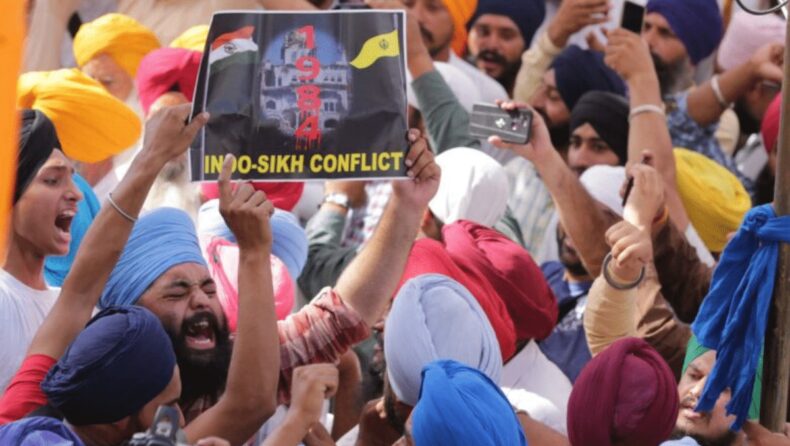The Indian government issued a warning to its citizens in Canada on September 23, claiming “a huge rise in cases of hate crimes, sectarian violence, and anti-India activities” in the North American nation.
“There has been a large rise in incidents of hate crimes, sectarian violence, and anti-India activities in Canada. The Ministry of External Affairs and our high commission/consulates-general in Canada have brought these incidents to the Canadian authorities and requested them to investigate the said crimes and take appropriate action. The perpetrators of these crimes in Canada have not yet been brought to justice,” tweeted the Ministry of External Affairs (MEA).
Although the govt claims there has been a rise in hate crimes across Canada, it has not given concrete instances or evidence to support this statement.
As a dispute has recently flared up between India and Canada over the recent conducting of a so-called referendum by ‘pro-Khalistan’ elements on building an independent country for Sikhs, the foreign ministry has issued an advisory. India has criticized the so-called Khalistan referendum held by separatist groups as a “farcical exercise.“
On September 19, over one hundred thousand Canadian Sikhs participated in the Khalistan Referendum in Brampton, Ontario, which was organized by the pro-Khalistani group Sikhs for Justice (SFJ). Social media images depicted a large number of men and women in line to vote in the Khalistan Referendum.
The warning came after news spread of a “referendum,” or vote, among Canadian Sikhs demanding an independent Khalistan state in the northern Indian state of Punjab.
Where it all started
In the 1980s, separatist activism reached its peak.
In June 1984, as part of a military operation targeting pro-Khalistan leaders, New Delhi dispatched troops to the Golden Temple, the holiest site of the Sikh community in Amritsar, Punjab. The army’s operation, known as Operation Blue Star, claimed the lives of hundreds of people.
The assassination of former Indian Prime Minister Indira Gandhi by two of her Sikh bodyguards in October of that year sparked widespread anti-Sikh riots that resulted in the deaths of hundreds.
Sikhs now comprise over 3 percent of Canada’s population, making up a sizable portion of the country’s 1.6 million active Indian diasporas. Defense Minister Anita Anand is one of Canada’s 17 Indian-born politicians and 3 cabinet ministers.
Canada’s acceptance of Khalistani separatist organizations has been brought up frequently by India.
When it comes to pro-Khalistan groups in Canada, New Delhi feels the Trudeau government hasn’t done enough to soothe its concerns.
According to a source, India’s MEA spokesperson Arindam Bagchi referred to the Canadian referendum as a “farcical exercise conducted by extremist and radical groups” on Thursday.
The Canadian government responded that it respects India’s sovereignty and territorial integrity and will not accept the so-called referendum.
Rise in hate crime, anti-India activities
As India warns its nationals in Canada of a “sharp rise in hate crimes,” Statistics Canada data indicates a 159% increase in the number of hate crimes recorded by the police since 2014.
Toronto (779), Vancouver (429), Montréal (260), Ottawa (260), and Calgary (139) recorded the highest number of hate crimes in 2021, according to a report published by Statistics Canada in August.
Since 2014, hate crimes motivated by race or ethnicity have also increased. Statistics Canada statistics revealed a 182% rise in these types of offenses. Since 2020, hate crimes have increased by 27%.
According to research by the Canadian Centre for Justice and Community Safety Statistics, the number of hate crimes increased in all provinces and territories in 2021 except for Yukon, where it stayed unchanged.
“More hate crimes targeting religion (+67%) (including Jewish, Muslim, and Catholic) and sexual orientation (+64%) accounted for the majority of the national change,” the report stated.
There will be a 21% rise in crimes committed against South Asians in 2021, which is the highest increase among populations targeted by crimes motivated by race or ethnicity. The 81 accidents reported in 2019 will rise to 164 by 2021.
“Much of the growth in hate crimes targeting race or ethnicity was due to more reported crimes targeting the Arab or West Asian population (+58 occurrences or +46%), and following high rises in 2020, more crimes targeting the East or Southeast Asian community (+42 incidents or +16%), and the South Asian population (+29 incidents or +21%),” according to the research.
Amid a major diplomatic spat, India issued an advisory warning its citizens to avoid participating in a referendum held by “pro-Khalistan” groups on establishing a separate nation for Sikhs.
There are 1.6 million persons of Indian descent including non-resident Indians living in Canada. At least two attacks on Hindu temples have occurred throughout the nation this year. Anti-India graffiti was found on the walls of a temple on September 15.













